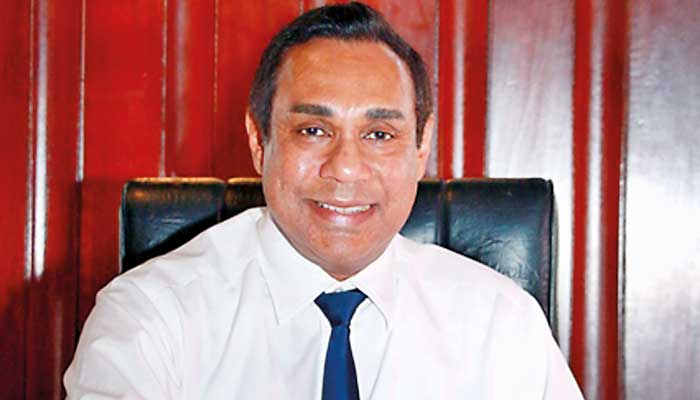Thursday Feb 26, 2026
Thursday Feb 26, 2026
Tuesday, 9 August 2016 00:03 - - {{hitsCtrl.values.hits}}

Q: The Government has decided to remove the minimum rate for hotels. What is your view on this?
A: First of all, this minimum rate is only applicable for hotels in Colombo city and not in other parts of the country where most of the resorts are located. I believe it’s a good thing to have a minimum rate in the city as prior to the introduction of the minimum rate structure, city hotel rates came down to as low as $ 40 to $ 50.
What needs to be emphasised here is that the Sri Lankan public and tourists are in no way adversely affected by 5-star city hotels charging $ 125 plus taxes. This will be applicable mainly to business and corporate clientele and other FIT travellers who patronise city hotels. I believe the minimum 5-star rate of $ 125 is on the low side compared to rates charged by other 5-star hotels in major capital cities.
Q: So you mean to believe that it’s a good thing to have the minimum rate?
A: Yes, it’s a good thing. It was introduced earlier at the request of the industry and not because the Government insisted on having a minimum rate mechanism. The industry requested the Government to gazette the rates and have a strict monitoring system in order to make it more meaningful. As a result of the minimum rate structure, people who can’t afford to stay in a 5-star can go to a 4-star hotel which is selling at $ 95 plus taxes or a 3-star of $ 75 plus taxes and 2-star at $ 60 plus taxes.
A wide range of choice continues to be available since minimum rates apply to city hotels in other categories as well, so there’s no hardship caused to the customers.
Q: What are the real benefits the country has earned out of the minimum rate?
A: The country has earned much-needed foreign currency. As I mentioned earlier, prior to the implementation of minimum rate, 5-star hotels were charging $ 40 to $ 50 from clients who were prepared to pay more. Thanks to minimum rates, 5-star hotels were compelled to charge $ 125, whereby the country earned more foreign currency.
Also, in the hotel industry we practice a great incentive scheme where 10% of the revenue is shared amongst the staff. Because of minimum rate, today in Colombo city, hotels’ service charges have gone up by 20%-30%, averaging Rs. 30,000 in 5-stars and Rs. 25,000 per month in 4-star hotels.
Today city hotels have been able to attract Sri Lankan staff from the Middle East, Maldives and other countries because of the higher service charge. Because of the minimum rate, new players have emerged, especially in the informal sector such as guest houses, apartments, budget hotels and youth hostels, etc. Once the minimum rate structure is removed and city hotel rates come down to previous levels, I wonder what will happen to the small players.
The minimum rate mechanism serves the purpose of social equity in two ways. Firstly, the remuneration of hotel staff is greatly increased as a result of high service charges and this brings about a significant improvement in their standards of living. Secondly, this mechanism creates space for the informal sector to develop and prosper.
Q: Don’t you think prices are determined by market forces and not by Government intervention?
A: It is generally correct to say market forces should determine price levels. However, as I mentioned earlier, this minimum price mechanism was introduced at the request of the industry and there is clear justification for this mechanism in terms of maintaining discipline and creation of a level playing field where other SMEs can also compete in the industry and it discourages price dumping and dishonest practices which leads to cutthroat competition.
Our practical experience has been that the minimum price mechanism, whilst ensuring that earnings from tourism have increased steadily from year to year, has also served a very useful preventive purpose.
Q: But aren’t hoteliers guilty of violating this rate agreement?
A: There could always be people who violate any agreement in the absence of proper monitoring. That’s why there should be more intensive form of monitoring and the need to regulate. The Tourist Board can outsource this function to an independent body like a reputed audit firm which will do random checks of hotels in order to ensure that everyone adheres to it. It must be remembered that there are only a limited number of city hotels, so monitoring and implementation will not be a difficult task.
Q: Colombo city has lost MICE business due to minimum rate. What are your views on this?
A: MICE is an important market for city hotels but unfortunately we lack proper MICE facilities to accommodate major exhibitions. There are a lot of plans which are in the pipeline but for MICE business to grow you need a number of other facilities such as world-class shopping, entertainment, restaurants, theme parks, etc.
We need to also look at more aggressive marketing and targeting the MICE market especially out of India. I do not agree with the practice of lowering rates to attract business. We should go for more quality over quantity.
Anyhow, if the authorities feel that the minimum rate mechanism is a major impediment for promoting MICE tourism, we could have found a way within the minimum rate mechanism as we have found a way with the airline crews where there’s a special rate for crews. Likewise, a special rate for MICE business generating over 50 rooms could have been worked out within the minimum rate structure if the authorities believe that minimum rate has done more good than harm to the hoteliers, staff and the country in general.